Ever decide to order a hot cheesy pizza right in the middle of doing the dishes?
If so, would you rather:
- Stop what you’re doing, dry your hands, pick up your phone, and type “Dominos delivery?”
- Lean over your shoulder and say “Dominos delivery” to your Google Home device?
Of course, #2 is easier, faster, and more convenient.
Enter, voice search.
For years, it’s been predicted to be the next big thing in search.
In fact, a 2016 article speculated that by the end of 2020, 50% of all searches would be voice searches.
So, is it true?
Is voice search finally here?
Is it the biggest thing today?
Why does it seem like it hasn’t actually taken over the world?
And if so, will it ever fully come into itself?
Let’s dig into the data.
3 Amazing Stats & Predictions About Voice Search
If you’re like me, you’ve probably been following every new development in voice search for a couple of years.
Advertisement
Continue Reading Below
Here are a bunch of stats and predictions to turn your head.
There Will Be 8 Billion Voice Assistants in Use by 2023
There are 4.2 billion voice assistants in use in 2020.
According to experts at Juniper Research, that number is going to double in only three years.
This means that there will be one voice assistant for every single person on the globe! (The global population is predicted to hit 8 billion by 2023.)
The Smart Speakers Market Will Be Worth $39.3 Billion in 2025
According to Grand Review Research, Inc., the reason for this growth will be caused by the integration of voice assistants with smart home devices.
Yup! You can arrive home on a rainy night and tell your Google Home device to turn on your lights, lock the doors, and play you some relaxing music. All while your fingers are dripping wet and freezing.
41% of People Who Own a Smart Speaker Say It Feels Like Talking to a Friend
Ever ask Siri, “What is the meaning of life?”
Advertisement
Continue Reading Below
I know you did. ?
Which means, you know she answered, “I find it odd that you would ask this of an inanimate object.”
*chuckle*
But you get the point.
A lot of us speak into our smart speakers and imagine another person at the other end, answering our questions.
It can even feel like talking to a friend.
With these mind-blowing predictions and stats, you’d think voice search has finally arrived.
But has it?
As a business owner, should you be throwing all your time, energy, and money into optimizing for voice search?
Should you build your own voice apps?
Probably not.
3 Reasons Not to Rely 100% on Voice Search Optimization
If you aren’t shoveling all your resources into optimizing for voice search, here are three reasons you could be right, according to Ad News.
Not Many People Are Making Purchases Through Voice Assistants
Imagine this.
You’re driving through unmoving traffic, and suddenly decide you’d like to buy a pair of running shoes.
Luckily, your smart speaker is beside you.
“Buy running shoes online,” you tell it.
In seconds, your speaker finds an amazing pair of running shoes for you.
You proceed to buy it, all while maneuvering through the traffic jam.
In a few days, it arrives at your doorstep and you’re super happy about it.
True story?
Probably not.
According to eMarketer, shopping with smart speakers isn’t taking off as expected.
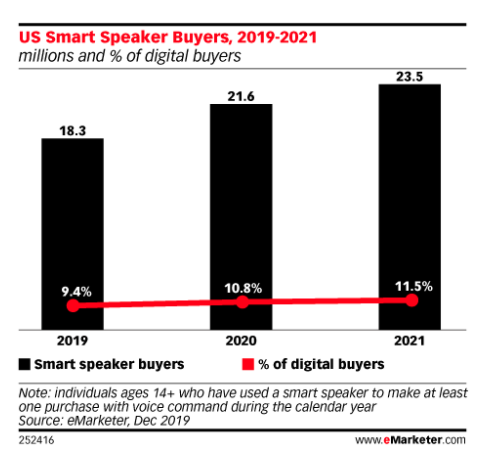
The reasons?
Advertisement
Continue Reading Below
- People don’t feel confident about security when making purchases through smart speakers.
- People want to see the item they’re buying before actually making the purchase (Google and Apple have addressed this problem by introducing smart speakers with their own screens, but many people already own the older screenless speakers and don’t feel they need an upgrade).
- People do ask smart speakers to add items to their shopping cart, but don’t make an actual purchase until they can do it manually.
Voice Search Doesn’t Give You Variety
What’s the best thing about going shopping?
The variety, of course.
You can check out different brands, compare them, and argue for or against them until your throat is dry.
But with a voice search, you can’t do much comparing.
All your smart speaker can do is guess which brand you’re into, but that won’t do much for your instinctive variety-seeking behavior as a shopper.
Voice Assistants Are Mostly Used for Simple Commands
Need to get up at 6 a.m. tomorrow?
Google Assistant can help you with that.
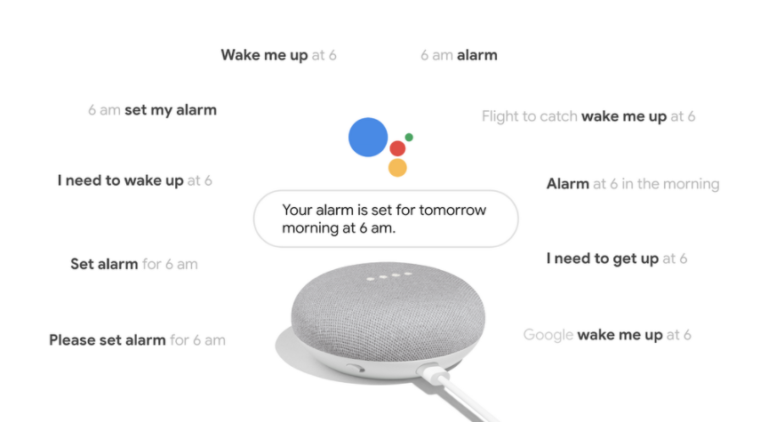
The thing is, you’d sooner use your voice assistant to help you get up early or tell you what the weather will be like tomorrow than search for a new brand or buy something.
Advertisement
Continue Reading Below
And you’re not alone.
In fact, people are 40x more likely to use a voice assistant to perform a simple action (think “play music” or “turn on my kitchen light”) than do a Google search.
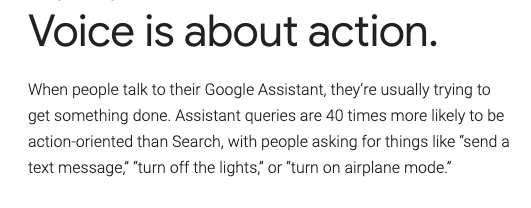
So, while billions of people own smart speakers today, they probably aren’t going to use them to buy something from you.
Why Optimizing for Voice Search Is Still a Good Idea
OK, so optimizing for voice search isn’t the magic formula that’ll boost your sales through the roof.
Advertisement
Continue Reading Below
If your neighbors are buying smart speakers, it’s probably to help them turn their lights on and off without getting up from the couch.
But here’s the thing.
There are people out there doing voice searches.
And if you optimize for voice search, it could be another piece in the puzzle of your digital marketing strategy.
Not the whole puzzle, but a really helpful piece.
Here are two reasons you should do it.
People Use Voice Search to Ask for Directions
Own a pizzeria or burger stand?
People are looking for you!
As they linger on the sidewalk, exhausted and hungry after a long day at work, they’ll pick up their phone and say, “Pizza.”
Their voice assistant will respond with a list of pizzerias near them.
And if yours is one of them, you get a new customer!
Sure, the voice search didn’t result in a direct purchase.
But it led a customer to your store, where he did make a purchase.
Advertisement
Continue Reading Below
Surprisingly, this happens more often than you think, as 40% of adults use voice to ask for directions.
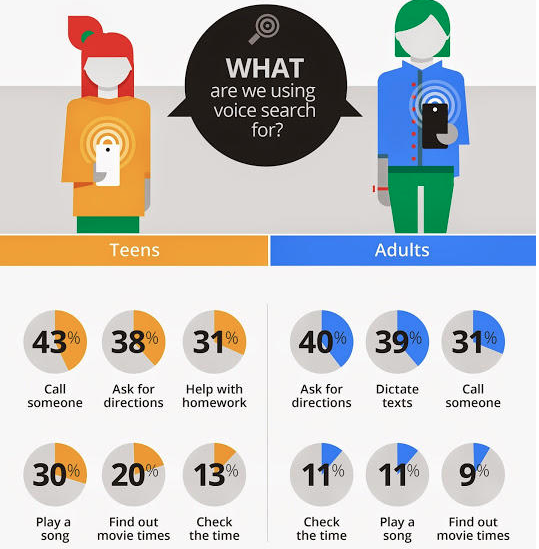
Voice Search Leads People to Discover Your Brand
Maybe optimizing for voice search isn’t like creating a landing page, which leads to direct revenue.
But it can help you grow your list of followers and increase your leads.
For instance, let’s say people address their voice assistant with, “How to write a blog.”
Advertisement
Continue Reading Below
If you’re the featured rich snippet for that keyword, the assistant will give your piece to the searcher.
If they like it, they’ll follow you and you’ll grow your leads.
How to Optimize for Voice Search: 3 Easy Steps to Follow
Sure, voice search hasn’t really come into itself yet.
But that doesn’t mean it never will.
In fact, it’s growing steadily as each year passes, and who knows?
As people become more confident with their voice assistants and more used to voice search, they could be making purchases through voice in a few years.
The best thing to do is to get ready for the explosion of voice search, whenever that comes.
Here are three ways you can do it.
1. Register for Google My Business
Registering for Google My Business allows Google to confirm the authenticity of your business. This means it’ll more likely bring up your name in a voice search.
The great news?
Advertisement
Continue Reading Below
Google My Business is free and super easy to use.
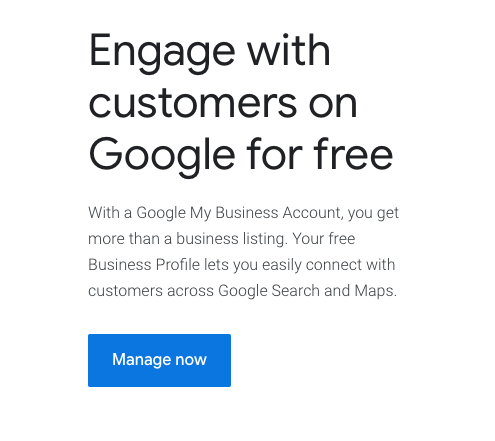
2. Optimize Your Site for Mobile
Chances are, you won’t be doing a voice search on your desktop.
You’ll probably do it while driving or washing the dishes.
This means, your customers are doing the same.
And you don’t want them to land on your site and feel unimpressed, or worse, frustrated.
To make sure they love your site, optimize it for mobile.
Advertisement
Continue Reading Below
This is as easy as:
- Making sure your buttons aren’t too small to be seen comfortably on a mobile device.
- Going for mobile-friendly plugins.
- Optimizing your site so it loads in under 3 seconds.
3. Get into Google’s Featured Snippets
This isn’t an easy task, but it’s the #1 reason you’ll be featured in a voice search.
For instance, if you ask your voice assistant, “How to use emojis in title tags,” you’ll get this:
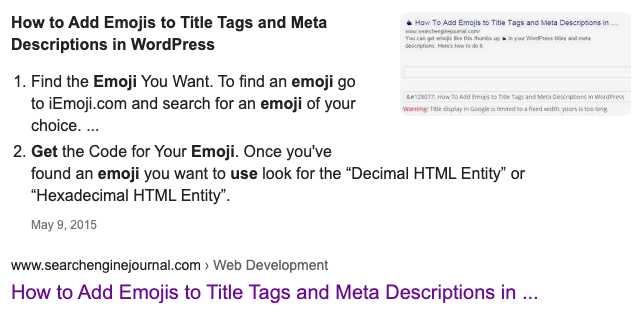
To get a bigger chance of getting into Google’s featured snippets, work on answering relevant question keywords briefly and directly.
Advertisement
Continue Reading Below
Voice Search: To Optimize or Not to Optimize?
I know, you’ve heard it a ton of times.
Voice search is going to explode into the biggest thing ever.
You’ve probably been hearing predictions like this since 2016.
But nothing huge has happened yet.
People are still using their keypads to type in text.
This makes you wonder, is optimizing for voice search a bad idea?
The answer: yes, and no.
Yes, if you’re going to drop all your other strategies and focus entirely on voice search.
(Your conversions and revenue will probably drop too.)
No, if you’re going to use voice search optimization as a small but important piece in your digital marketing puzzle.
More Resources:
Image Credits
All screenshots taken by author, October 2020


